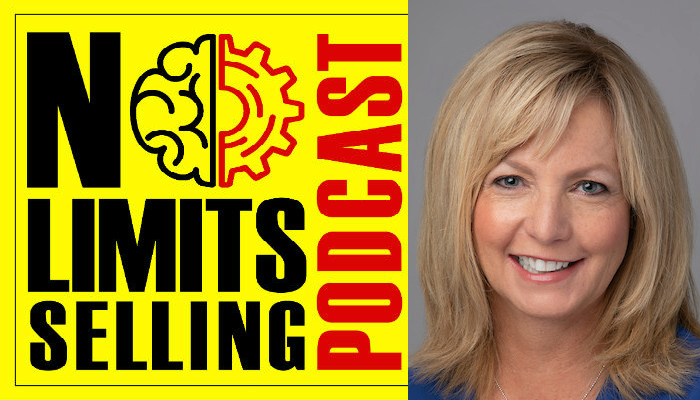Gretchen Gordon on Sales Mindset
On Episode 73 of The No Limits Selling Podcast, we have Gretchen Gordon, President of Braveheart Sales Performance leads a team of consultants who solve sales problems for clients. She is an award-winning Sales Management blogger and has been recognized repeatedly as a Top 50 Sales Influencer. She is a dynamic speaker at conferences and events and contributes sales articles to a variety of publications and sites focused on effective sales leadership having been published by Selling Power. Gretchen is an avid competitive golfer and is a student of performance psychology. She loves to explore the parallels between sports and sales performance.
Gordon is not your typical sales consultant or speaker, in that sales did not come naturally to her. After a failed Girl Scout cookie sales career, followed by a miserable P&G sales stint, Gordon overcame her fears and hesitancies related to sales and became an award-winning salesperson, sales manager, and leader. She ultimately founded Braveheart to help businesses empower their sales teams to execute at the highest level. She is fascinated by the science of selling and captures her audiences with real-life stories and data while providing them with actionable takeaways.
As a self-proclaimed sales nerd, Gretchen is passionate about saving the world, one sales team at a time.
Check out my Success Mindset Course

Contact Gretchen:
#nolimitsselling #podcastinterview
[EDITOR’S NOTE: This podcast is sponsored by No Limits Selling. It is a fun, fast-paced podcast that delivers hard-fought business advice that you can implement today to improve your sales and performance]
Interested In Our Real Estate Coaching Services? Explore Our Website: Link
Feeling Not Well Today? You Can Use Our Mindset Boosters App To amp Up Your Mood: Link
Find us on Social Media:
LinkedIn | Facebook community | Instagram
Like what do you listen to? Subscribe to our podcast!
Ready to become fearless? We can help you become fearless in 60 days so you accomplish more in your career Schedule A 15 min Call with UmarSummary
Introduction and Background
The podcast begins with an introduction of Gretchen Gordon, the founder and president of Braveheart Sales Performance. The host, Umar Hameed, and Gretchen met at the Sales 3.0 conference. Gretchen's company focuses on unlocking the potential trapped within salespeople by addressing their mindset.
Sales DNA
Gretchen introduces the concept of "Sales DNA," which refers to the underlying elements that impact a salesperson's ability to utilize learned tactics and skills. While tactical skills are visible, Sales DNA, like an iceberg, lurks beneath the surface and is a much larger component. It includes elements like beliefs, motivations, and thoughts that either support or sabotage a salesperson's ability to effectively use the tactics they have learned.
Beliefs about Salespeople
Umar shares an exercise he does with salespeople where he asks them to finish the sentence "Salespeople are..." The responses start positively, with attributes like "driven" and "motivated," but eventually, negative stereotypes such as "sleazy" and "untrustworthy" emerge. Umar explains that these negative beliefs about salespeople are absorbed from society and can hinder a salesperson's performance.
Data on Salespeople
Gretchen shares data on about 600,000 salespeople from all walks of life. The data reveals that 85% of these salespeople have self-limiting beliefs that derail them in some aspect of sales. These self-limiting beliefs cause them difficulty and can prevent them from reaching their full potential.
The Impact of Unconscious Beliefs
Umar emphasizes that these self-limiting beliefs often sit in the unconscious, making us unaware of them. We only become aware of our behaviors, and sometimes, despite knowing what we want to do and how to do it, we don't execute due to these underlying beliefs. Overcoming these beliefs can lead to significant improvements in performance.
Advice for Sales Managers
Towards the end of the podcast, Gretchen gives advice to sales managers. She suggests that they pay attention and give their people daily missions, focusing on preparation for conversations rather than just shooting from the hip. This approach can help salespeople have more effective conversations with prospects and customers.
Conclusion
In the podcast interview, Gretchen Gordon, the founder and president of Braveheart Sales Performance, discusses the concept of "Sales DNA" and the impact of self-limiting beliefs on sales performance. She emphasizes that while tactical skills are important, underlying elements like beliefs, motivations, and thoughts, which form the Sales DNA, play a significant role in a salesperson's effectiveness. Gretchen shares data revealing that a large proportion of salespeople have self-limiting beliefs that hinder their performance.
The conversation also highlights the societal stereotypes about salespeople, which can unconsciously affect their behaviors and performance. Gretchen concludes by advising sales managers to focus on preparation and give their teams daily missions to improve their effectiveness in customer interactions. The podcast underscores the importance of mindset in sales and the need to address and overcome self-limiting beliefs to unlock sales potential.
Questions & Answers
Who is Gretchen Gordon?
What is the concept of "Sales DNA"?
What are self-limiting beliefs in sales?
How prevalent are self-limiting beliefs among salespeople?
How can sales managers help their teams overcome self-limiting beliefs?
What is the impact of societal stereotypes on salespeople?
How can salespeople overcome self-limiting beliefs?
What is the role of mindset in sales?
How can salespeople improve their Sales DNA?
What is the mission of Braveheart Sales Performance?
Don’t miss this opportunity to transform your real estate career with one-on-one coaching. As an experienced real estate coach, I, Umar Hameed, am dedicated to helping you unlock your full potential and achieve your real estate goals. To learn more about who am I and my clients ↓
If you’re ready to take the next step, book an appointment with me today and begin your journey toward success in the real estate industry.
